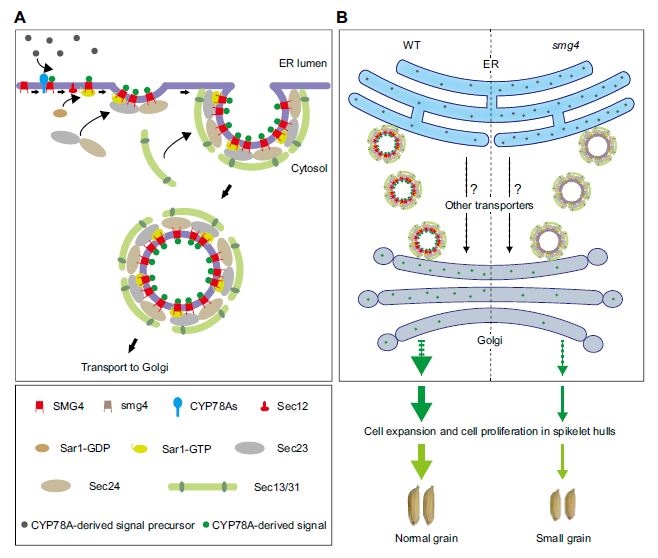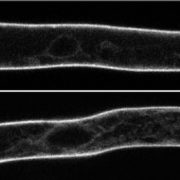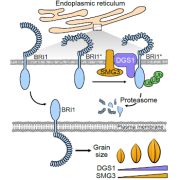A MATE transporter regulates grain size in rice
Zhou et al. discover a molecular mechanism of rice grain size regulation.
https://doi.org/10.1093/plcell/koad239
By Chunlei Zhou from Nanjing Agricultural University
Background: Grain size is a key factor for determining grain yield. Many genes or quantitative trait loci (QTLs) that regulate grain size have been identified. Among them, members of the CYP78A cytochrome P450 subfamily are conserved regulators of grain (seed) size in plants. However, the relation between CYP78As and other grain size regulators is largely unknown. Although CYP78As have been reported to likely function by generating a mobile growth signal, the underlying molecular mechanism remains elusive.
Question: What is the regulatory pathway of grain size involving CYP78As? What is the molecular and genetic mechanism behind it?

Figure: A proposed working model for SMG4’s role in regulating rice grain size. A) CYP78As may catalyze and generate a growth signal (CYP78A-derived signal) in the ER, and SMG4 interacts with CYP78As to receive the CYP78A-derived signal. Then, SMG4 interacts with COPII components to transmit the CYP78A-derived signal from the ER to Golgi. B) In WT, CYP78A-derived signals are transported from the ER to Golgi normally to promote cell expansion and cell proliferation in spikelet hulls, thus leading to normal grains. In smg4, the transport of CYP78A-derived signal from the ER to Golgi is disrupted, thus restricting cell expansion and cell proliferation in spikelet hulls and finally leading to small grains.
Findings: Here we identified a MATE transporter, SMALL GRAIN 4 (SMG4), that regulates grain size in rice. Loss of function of SMG4 causes smaller grains, while overexpressing SMG4 results in larger grains. SMG4 is mainly localized to ER exit sites (ERESs) and partially localized to the endoplasmic reticulum and Golgi. Biochemical assays showed that SMG4 interacts with CYP78As (BG2, GRAIN LENGTH 3.2 [GL3.2], and BG2-LIKE 1 [BG2L1]) and COPⅡ components (Sar1, Sec23, and Sec24). Genetic analyses suggest that CYP78As, SMG4, and Sar1 likely act, at least in part, in a common pathway to regulate grain size. Taken together, our findings reveal that a CYP78As–SMG4–COPⅡ pathway promotes grain size in rice, thus providing a new strategy for improving grain size and yield in crops.
Next step:We will further investigate the nature of the CYP78A-derived signal transported by SMG4, and reveal how it is transmitted.
Reference:
Chunlei Zhou, Qibing Lin, Yulong Ren, Jie Lan, Rong Miao, Miao Feng, Xin Wang, Xi Liu, Shengzhong Zhang, Tian Pan, Jiachang Wang, Sheng Luo, Jinsheng Qian, Wenfan Luo, Changling Mou, Thanhliem Nguyen, Zhijun Cheng, Xin Zhang, Cailin Lei, Shanshan Zhu, Xiuping Guo, Jie Wang, Zhichao Zhao, Shijia Liu, Ling Jiang, and Jianmin Wan (2023). A CYP78As–small grain4–coat protein complex Ⅱ pathway promotes grain size in rice. https://doi.org/10.1093/plcell/koad239






